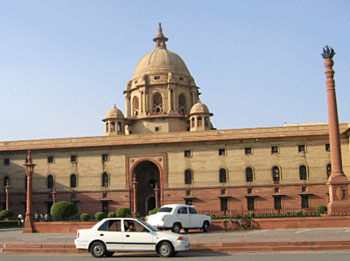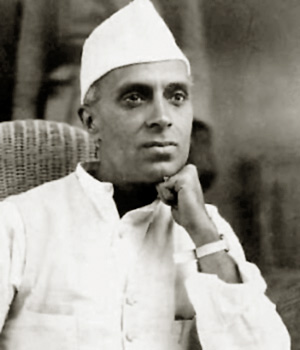 Prime minister`s office is the organ of the Government of India which helps the Prime minister to perform his parliamentary, political and public responsibilities. Located in the South block of Rashtrapati Bhavan at Raisina hills of New Delhi, this office lies between the cabinet secretariat at one side and ministries of External affairs and defence on the other side. The 20 room prime minister`s office is one of the best equipped rooms with the latest technological accessories and communication devices that are installed to provide infrastructural facilities to the chief executive of India. This room is well equipped to monitor the domestic and international developments that happen in India.
Prime minister`s office is the organ of the Government of India which helps the Prime minister to perform his parliamentary, political and public responsibilities. Located in the South block of Rashtrapati Bhavan at Raisina hills of New Delhi, this office lies between the cabinet secretariat at one side and ministries of External affairs and defence on the other side. The 20 room prime minister`s office is one of the best equipped rooms with the latest technological accessories and communication devices that are installed to provide infrastructural facilities to the chief executive of India. This room is well equipped to monitor the domestic and international developments that happen in India.
Prime Minister`s office include a number of joint secretaries, and deputy secretaries along with principle secretary, National security Adviser, Secretary, Media adviser, additional secretary as well as two private secretaries who assist the Prime minister to perform his functions. Being the closest this office is supposed to be the most powerful office of the country that is responsible for all the crucial decisions of the nation. Since Independence Prime minister`s office has gained a lot of responsibilities with every new Prime minister of India. This Office was one of the modest institutions at the time of Jawahar Lal Nehru which gained new powers under Lal Bahadur Shastri. During his tenure he appointed some senior level civil servants with specialised knowledge who could assist the PM. This continued at the time of Mrs Indira Gandhi when she came to power in 1966 and chose to continue with the usual convention. While there had been some controversies regarding the role of PM`s office under Indira Gandhi; yet as an administrative unit this organisation continued to playa crucial role in running the administration of the nation.
 Prime Minister`s office underwent further changes under the Janata Party in 1977 that came to power by overthrowing Indira Gandhi`s party in the General Elections. The Janata Government which was a short lived government was soon removed by Congress (I) which came back with new strategic changes. This time the PM`s office gained better wisdom with eminent intellectuals like P.C.Alexander, G. Parthasarathy, and others. With such talented team the Prime minister`s office became one of the most powerful institutions of Government of India. With the tenure of Rajiv Gandhi this office got even more strengthened with three full- fledged secretaries to government of India, three additional secretaries, five joint secretaries and a number of OSDs and advisors who could assist the government to take the more reliable decisions. Overall this institution underwent a number of changes with change in Party and selection of new Prime Minister. In spite of the changes this continues to remain as one of the most powerful administrative unit of India.
Prime Minister`s office underwent further changes under the Janata Party in 1977 that came to power by overthrowing Indira Gandhi`s party in the General Elections. The Janata Government which was a short lived government was soon removed by Congress (I) which came back with new strategic changes. This time the PM`s office gained better wisdom with eminent intellectuals like P.C.Alexander, G. Parthasarathy, and others. With such talented team the Prime minister`s office became one of the most powerful institutions of Government of India. With the tenure of Rajiv Gandhi this office got even more strengthened with three full- fledged secretaries to government of India, three additional secretaries, five joint secretaries and a number of OSDs and advisors who could assist the government to take the more reliable decisions. Overall this institution underwent a number of changes with change in Party and selection of new Prime Minister. In spite of the changes this continues to remain as one of the most powerful administrative unit of India.
Prime Minister`s office as of today renders a number of responsibilities. It includes some new units like anti- corruption unit and public wing dealing with public grievances that function along with other departments like Department of Space, Atomic Energy, and Ministry of Personnel. Regarding subject matters it takes up the files that include direct charges either on the ministries or on the cabinet minister, or minister of various departments as independent charge or a charge of misappropriation on the ministry as a whole. It further includes the cases where the PM is in charge of the ministry and the files are not delegated anywhere else are sent to PM`s office for orders. As the Prime minister is the Chairman of Planning Commission the files regarding planning commission are also placed for his decisions.
Prime Minister`s office as such it takes up all the issues that require direct orders of the Prime minister as in case of important defence-related issues; decorations, both civilian and defence, where Presidential approval is required; all important policy issues; all important decisions relating to the Cabinet Secretariat; appointments to State Administrative Tribunals and the Central Administrative Tribunal, Union Public Service Commission, Election Commission of India, Appointment of members of statutory/constitutional Committees, Commissions attached to various Ministries; all policy matters relating to the administration of the Civil Services and administrative reforms; special Packages announced by the Prime Minister for States are monitored in the PMO and periodical reports submitted to Prime Minister; and all judicial appointments for which Presidential approval is required.
Thus as the highest administrative unit of government of India this has largely functioned to assist the Prime minister in executing his public responsibility with utmost transparency.




















